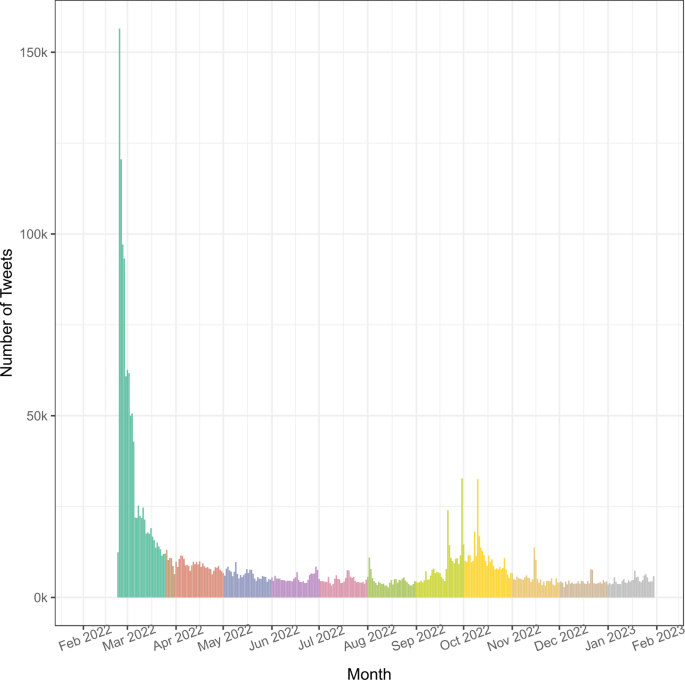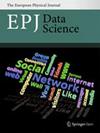Arab reactions towards Russo-Ukrainian war
IF 2.5
2区 计算机科学
Q1 MATHEMATICS, INTERDISCIPLINARY APPLICATIONS
引用次数: 0
Abstract
Abstract The aim of this paper is to analyze the Arab peoples reactions and attitudes towards the Russo-Ukraine War through the social media of posted tweets, as a fast means to express opinions. We scrapped over 3 million tweets using some keywords that are related to the war and performed sentiment, emotion, and partiality analyses. For sentiment analysis, we employed a voting technique of several pre-trained Arabic language foundational models. For emotion analysis, we utilized a pre-constructed emotion lexicon. The partiality is analyzed through classifying tweets as being ‘Pro-Russia’, ‘Pro-Ukraine’, or ‘Neither’; and it indicates the bias or empathy towards either of the conflicting parties. This was achieved by constructing a weighted lexicon of n-grams related to either side. We found that the majority of the tweets carried ‘Negative’ sentiment. Emotions were not that obvious with a lot of tweets carrying ‘Mixed Feelings’. The more decisive tweets conveyed either ‘Joy’ or ‘Anger’ emotions. This may be attributed to celebrating victory (‘Joy’) or complaining from destruction (‘Anger’). Finally, for partiality analysis, the amount of tweets classified as being ‘Pro-Ukraine’ was slightly greater than Pro-Russia’ at the beginning of the war (specifically from Feb 2022 till April 2022) then slowly began to decrease until they nearly converged at the start of June 2022 with a shift happening in the empathy towards Russia in August 2022. Our Interpretation for that is with the initial Russian fierce and surprise attack at the beginning and the amount of refugees who escaped to neighboring countries, Ukraine gained much empathy. However, by April 2022, Russian intensity has been decreased and with heavy sanctions the U.S. and West have applied on Russia, Russia has begun to gain such empathy with decrease on the Ukrainian side.

阿拉伯对俄乌战争的反应
本文的目的是分析阿拉伯人对俄乌战争的反应和态度,通过发布推特作为一种快速表达意见的手段。我们使用一些与战争相关的关键词删除了超过300万条推文,并进行了情绪、情感和偏袒分析。对于情感分析,我们采用了几个预训练的阿拉伯语基础模型的投票技术。对于情绪分析,我们使用了一个预先构建的情绪词汇。通过将推文分类为“亲俄罗斯”、“亲乌克兰”或“两者都不是”来分析这种偏袒;它表明了对冲突双方中的任何一方的偏见或同情。这是通过构建一个与两边相关的n个grams的加权词典来实现的。我们发现大多数推文都带有“负面”情绪。人们的情绪并不那么明显,很多推特上都写着“百感交集”。更果断的推文传达了“喜悦”或“愤怒”的情绪。这可能归因于庆祝胜利(“喜悦”)或抱怨破坏(“愤怒”)。最后,为了偏袒分析,在战争开始时(特别是从2022年2月到2022年4月),被归类为“亲乌克兰”的推文数量略高于“亲俄罗斯”,然后慢慢开始减少,直到2022年6月初它们几乎趋同,2022年8月对俄罗斯的同情发生了转变。我们的解释是,一开始俄罗斯猛烈而突然的袭击,以及逃到邻国的难民数量,乌克兰得到了很多同情。然而,到2022年4月,俄罗斯的强度有所下降,随着美国和西方对俄罗斯的严厉制裁,俄罗斯开始获得乌克兰方面减少的同情。
本文章由计算机程序翻译,如有差异,请以英文原文为准。
求助全文
约1分钟内获得全文
求助全文
来源期刊

EPJ Data Science
MATHEMATICS, INTERDISCIPLINARY APPLICATIONS -
CiteScore
6.10
自引率
5.60%
发文量
53
审稿时长
13 weeks
期刊介绍:
EPJ Data Science covers a broad range of research areas and applications and particularly encourages contributions from techno-socio-economic systems, where it comprises those research lines that now regard the digital “tracks” of human beings as first-order objects for scientific investigation. Topics include, but are not limited to, human behavior, social interaction (including animal societies), economic and financial systems, management and business networks, socio-technical infrastructure, health and environmental systems, the science of science, as well as general risk and crisis scenario forecasting up to and including policy advice.
 求助内容:
求助内容: 应助结果提醒方式:
应助结果提醒方式:


